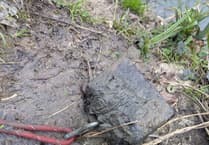Fly-tipped waste was discovered almost 2,000 times in Mendip last year, new figures show.
Environmental charity Keep Britain Tidy said the high level of fly-tipping seen across England is a "tragedy" to the environment and to communities.
Department for Environment, Food and Rural Affairs figures reveal there were 1,896 fly-tipping incidents in Mendip in the year to March 2022 – though this was down from 2,283 the year before.
A significant amount of fly-tipping in the area last year was discovered on highways (90%).
Of the discarded waste, the largest proportion was household black bin bags (38%) followed by household waste (31%).
The data also shows £14,733 was paid by councils on removing large incidents of fly-tipping in Mendip.
Across England, 1.09 million fly-tipping incidents were recorded in 2021-22– a decrease of 4% from the 1.14 million reported in 2020-21. The cost of clearance to local authorities was £10.7 million last year.
Allison Ogden-Newton OBE, Keep Britain Tidy chief executive, said: “A million plus fly-tipping incidents is a tragedy for the environment and communities and illustrates just how little people understand about the impact their unwanted ‘stuff’ can have."
Ms Ogden-Newton added there must be a concerted effort to educate the public about their role in solving the problem.“We need immediate and tough enforcement that targets the rogue traders who are making a fortune by breaking the law, raking in the cash and wrecking our environment," she added.
The Defra figures show about 91,000 fixed penalty notices were issued across England in 2021-22, an increase of 58% from 2020-21.
And the number of court fines nearly tripled from just 621 in 2021-21 to 1,798 last year.
The value of all fines was £840,000 in 2021-22, more than doubling the £330,000 from the year before.
In Mendip, 24 fixed penalty notices were issued last year, up from 15 in 2020-21.
David Renard, environment spokesperson for the Local Government Association, said fly-tipping is not just an eyesore for residents, but a serious environmental and public health risk.
Mr Renard added: “Councils are working tirelessly to counter the thousands of incidents every year and are determined to crack down on the problem, so it is good to see that the number of enforcement actions has increased.
“However, penalties handed down from prosecution fail to match the severity of the offence committed. We continue to urge the Government to review sentencing guidelines for fly-tipping so that offenders are given bigger fines for more serious offences to act as a deterrent."




